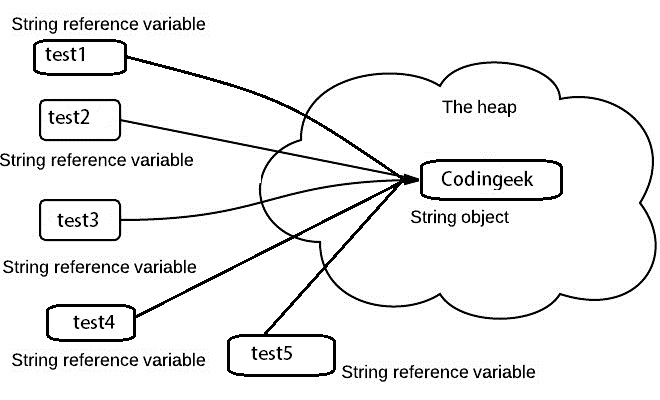Why Are Strings Immutable in Java? Discovering the Style Choices
Wiki Article
Exploring the Advantages of Unalterable Strings in Modern Programming Paradigms
In the world of modern programs standards, the principle of immutable strings stands as a keystone of durable software application growth. The benefits they provide surpass simple comfort; they basically change the method information is dealt with within applications. By adopting immutable strings, programmers can guarantee improved data honesty, improved thread safety and security, simplified debugging processes, enhanced safety actions, and effective performance optimization. These benefits act as a testimony to the profound impact that embracing immutability can have on the reliability and efficiency of software systems.Improved Information Stability

By preventing the adjustment of string objects, immutability gets rid of the risk of unintentional modifications to the data they hold. This not only improves the security of the information however additionally boosts the reliability of the code that depends on these strings.
Immutability also supports much safer multithreading atmospheres, as simultaneous access to immutable strings does not posture the risk of information corruption with synchronised alterations. This residential or commercial property streamlines the procedure of taking care of strings in parallel programs situations.
In significance, immutability works as a safety guard around the information stored within strings, boosting their integrity by making sure that once defined, their values continue to be the same throughout the program's execution.

Improved Thread Safety And Security
Unalterable strings enhance the thread safety of programs by making sure that once a string object is created, its worth can not be changed. This home eliminates the risk of simultaneous strings attempting to modify the very same string concurrently, which might bring about data corruption or irregular states in the program - Why are strings immutable in Java?. In a multi-threaded setting, where multiple threads accessibility and manipulate information simultaneously, the immutability of strings supplies a level of security by assuring that the information remains unchanged throughout its lifecycleSimplified Debugging Procedures
Provided the enhanced thread safety assisted in by immutable strings, a substantial benefit emerges in the realm of simplified debugging processes. Unalterable strings, when developed, can not be altered, making it less complicated to map the flow of data and determine the source of insects in a program. This immutability makes certain that strings continue to be constant throughout the execution of the program, lowering the probability of unanticipated modifications that might bring about errors.When debugging with mutable strings, developers usually encounter issues where a string's value is modified unintentionally, making it challenging to identify the root cause of an insect. However, with unalterable strings, the information remains unchanged, permitting programmers to concentrate on evaluating the actual reasoning of the code instead than tracking down where and when a string was customized incorrectly.
Furthermore, unalterable strings streamline the he has a good point debugging process by allowing much easier reproduction of insects. Since unalterable strings do not transform state, developers can recreate and research insects better, causing quicker identification and resolution of issues within the codebase. This streamlined debugging operations inevitably adds to higher software application quality and improved overall development efficiency.

Increased Safety And Security Actions
Enhancing information protection and strengthening system integrity, the usage of immutable strings in software applications contributes considerably to increased security steps. Unalterable strings, as soon as developed, can not be modified, providing an essential protection against harmful meddling or unauthorized gain access to. By making certain that delicate information saved in strings stays unchanged throughout the program's implementation, the danger of information breaches or shot strikes is substantially decreased. Why are strings immutable in Java?. Unalterable strings additionally play a crucial duty in avoiding common safety and security susceptabilities such as buffer overflows and SQL injection assaults, as attempts to control string information at runtime are naturally limited.In addition, the immutability of strings improves the predictability of program habits, making it much easier to confirm inputs and stop unexpected adjustments that can compromise security. This predictability streamlines the procedure of bookkeeping and click here for more info verifying code, making it possible for programmers to identify potential security loopholes better. Generally, incorporating immutable strings right into software development practices not just enhances the effectiveness and dependability of applications but likewise reinforces their resilience versus safety threats.
Efficient Performance Optimization
Building upon the structure of increased security procedures attained via the utilization of immutable strings, an essential element to consider in software application development is reliable performance optimization. When managing mutable strings, operations like concatenation or substring development typically result in the development of brand-new string objects, bring about memory expenses and enhanced processing time. Nevertheless, with immutable strings, these procedures can be optimized to boost performance. By permitting strings to remain stable and constant, immutable strings promote better memory monitoring and caching chances, inevitably boosting the overall efficiency of the software application.
Unalterable strings also play a vital function in multithreaded settings by promoting thread security. Why are strings immutable in Java?. Given that unalterable strings can not be customized once created, they can be shared throughout strings without the threat of unexpected modifications, decreasing the need for synchronization mechanisms and enhancing concurrency. In addition, immutable strings simplify debugging processes as developers can trust that a string's worth will continue to be consistent throughout the program's implementation, removing possible errors caused by mutable state changes. In verdict, the usage of immutable strings not just boosts safety but also significantly adds to the efficient efficiency optimization of contemporary software systems.
Verdict
In final thought, the benefits of utilizing unalterable strings in modern shows paradigms can not be overstated. Boosted data integrity, enhanced thread security, simplified debugging procedures, boosted safety steps, and efficient efficiency optimization all add to the overall efficiency of programs jobs. By integrating immutable strings right into shows techniques, developers can take advantage of an extra visit the website durable and reputable codebase.Immutability, a key feature of strings in shows languages such as Java and Python, ensures that when a string things is produced, it can not be changed or customized.Immutable strings enhance the string security of programs by making certain that once a string object is developed, its value can not be modified. Immutable strings likewise play a crucial duty in stopping typical protection vulnerabilities such as barrier overflows and SQL injection assaults, as efforts to manipulate string data at runtime are naturally restricted.
By allowing strings to remain stable and continuous, immutable strings help with better memory administration and caching opportunities, ultimately increasing the overall performance of the software.
Unalterable strings simplify debugging processes as programmers can rely on that a string's worth will stay constant throughout the program's execution, getting rid of prospective errors caused by mutable state adjustments.
Report this wiki page